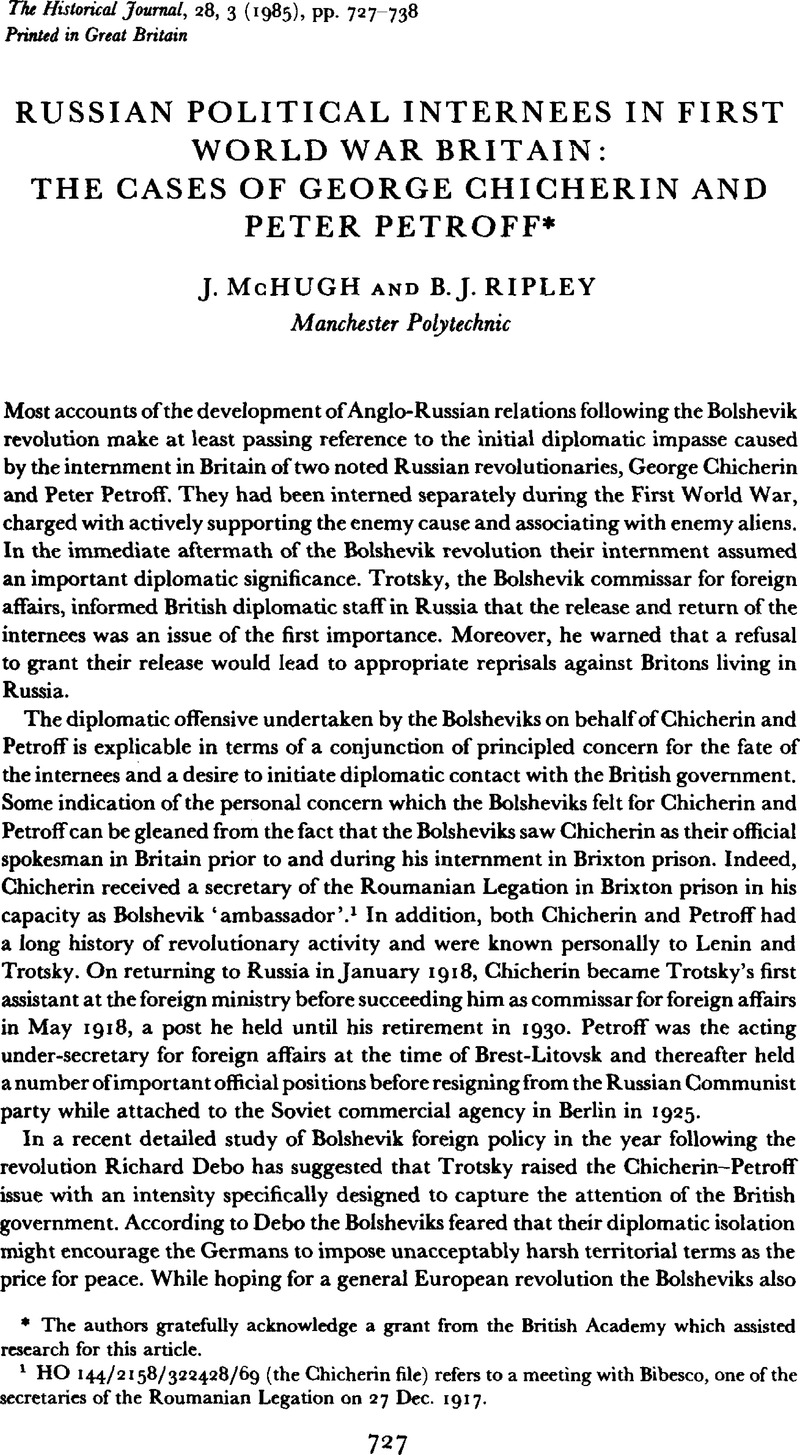No CrossRef data available.
Article contents
Russian Political Internees in First World War Britain: The cases of George Chicherin and Peter Petroff*
Published online by Cambridge University Press: 11 February 2009
Abstract

- Type
- Communications
- Information
- Copyright
- Copyright © Cambridge University Press 1985
References
1 HO 144/2158/322428/69 (the Chicherin file) refers to a meeting with Bibesco, one of the secretaries of the Roumanian Legation on 27 Dec. 1917.
2 Debo, R. K., Revolution and survival: the foreign policy of Soviet Russia, 1917–18 (Liverpool, 1979). p. 34–CrossRefGoogle Scholar.
3 Ullman, R.. Anglo-Soviet relations, 1917–21 (1961), pp. 33–5Google Scholar. Ullman reports that Petroff and Chicherin were released at a time when they were still in custody. Moreover, he incorrectly asserts that Petroff as well as Chicherin was in charge of the Exiles Repatriation Committee set up after the Kerensky revolution. These errors derive from a Times report which incorrectly announced the release of Petroff and Chicherin.
4 Kendall, W., The revolutionary movement in Britain, 1900–21 (1969), p. 335Google Scholar.
5 Justice, 23 Dec. 1915.
6 Ibid.
7 The following account of Petroff's arrest, court appearances and subsequent internment is taken from King's, Joseph speech in the house of commons, H. C. Debs. (5th series), LXXXI, 453–4Google Scholar. This in turn was based upon Petroff's own written account sent to King.
8 This letter to Llewellyn-Smith from Patterson dated 17 Jan. 1916 is in the Beveridge collection, III. 3.
9 Cf. Debo, R. K., ‘The making of a Bolshevik: Georgii Chicherin in England 1914–1918’, The Slavic Review, xxv, 4 (1966), 651 ffCrossRefGoogle Scholar.
10 Cf. HO 144/2158/322428/28. The advisory committee which heard Chicherin's appeal against internment noted that although Chicherin denied that he was the head of the exiles' committee ‘he admitted that it was in his absolute discretion to summon the committee together whenever he thought it necessary or desirable. It was he who recorded and kept account of its transactions…it is clear that he was the moving spirit:’
11 Cotton Factory Times, 7 Jan. 1916.
12 H. C. Debs., LXXX, 222.
13 Ibid, LXXXI, 456.
14 Ibid, LXXXI, 457.
15 Labour Leader, 16 Mar. 1916.
16 H. C. Debs., XCII, 422.
17 Ibid, XCII, 612.
18 HO 45/10820/318095/198.
19 H. C. Debs., XC, 1853–4.
20 Cotton Factory Times, 23 March 1917.
21 HO 45/10820/318095/238.
22 Nabokoff, C., The ordeal of a diplomat (1921)Google Scholar.
23 H. C. Debs., XCV, 1597, 1653–6.
24 House of Lords Debs., XXVIII, 175–80.
25 HO 144/2158/322428/88.
26 HO 144/2158/322428.
27 HO 144/2158/322428/6.
28 Ibid.
29 Ibid.
30 Ibid.
31 HO 144/2158/322428/12.
32 Ibid. HO 144/2158/322428/9.
33 The Call, 23 Aug. 1917.
34 HO 144/2158/322428/16.
35 HO 144/2158/322428/28.
36 H. C. Debs., c, 574.
37 CAB 23/4/286/7.
38 CAB 23/4/288/6.
39 Buchanan, Sir G., My mission to Russia (1923), II, 228Google Scholar.
40 George, D. Lloyd, War memoirs (1923), p. 1546Google Scholar.
41 CAB 23/4/295/15.
42 John or Taba Sairio, Samuel Hasse and Siegfried Nantenbruk, all described as Russian subjects and members of the Communist Club, had been interned by orders made on 31 Jan. 1917. They were deported with two other Russians, Miniovitch and Washingsky, on 23 Feb. 1918
43 FO 371/3295/6933.
44 Lockhart, R. H. Bruce, Memoirs of a British agent (1974), p. 202Google Scholar.
45 Sisson, E., One hundred red days (Westport, 1977), p. 303Google Scholar. Sisson's account of what happened over Petroff's attempt to re-enter Britain is based on a telegram sent by Chicherin to Trotsky which was intercepted and translated by British Military Intelligence. The transcript on which his account is based was in the possession of E. T. Boyce.
46 Ibid.
47 Ibid.
48 In fact Lockhart did inform London of the desirability of giving a visa to the passport asked for by the Bolshevik government and suggested that Britain formally recognize the Bolshevik government. Bruce Lockhart's telegram was discussed by the cabinet on 8 Feb. 1918. Cf. Middlemas, K. (ed.), Thomas Jones: Whitehall Diary, I, 1916–25 (Oxford, 1969), p. 49Google Scholar.
49 Sisson, , Red days, p. 306Google Scholar.
50 CAB 24/41/3587 dated 9 Feb. 1918.


